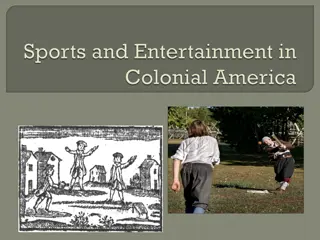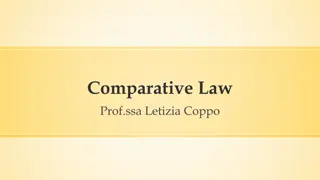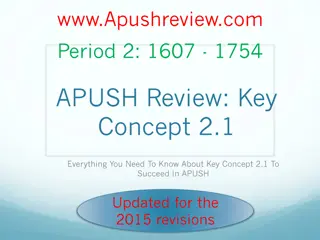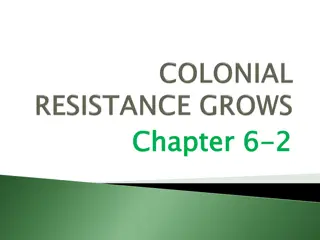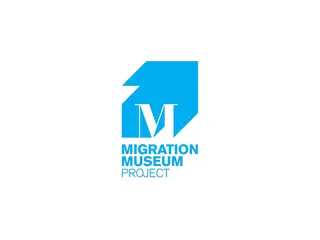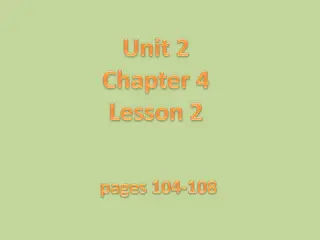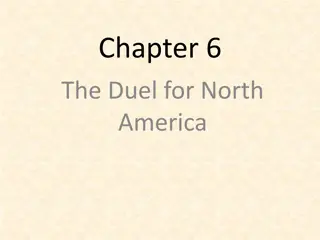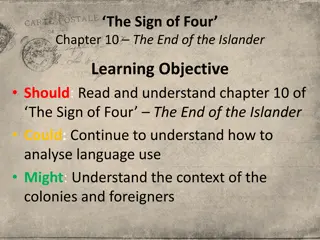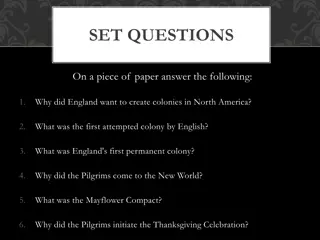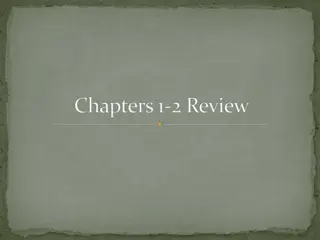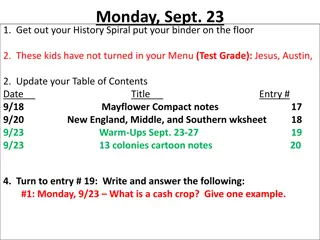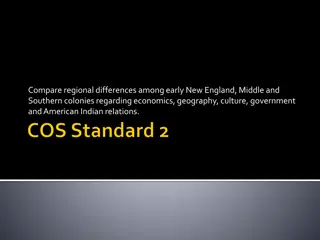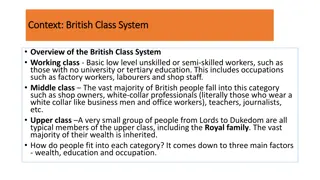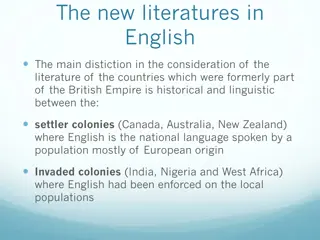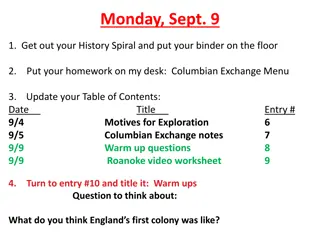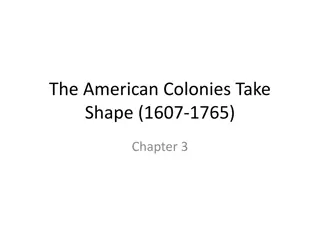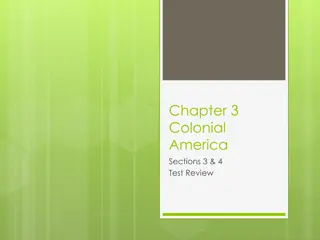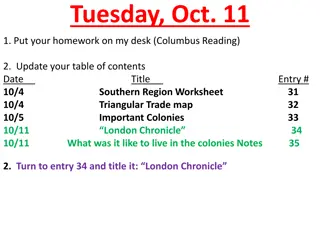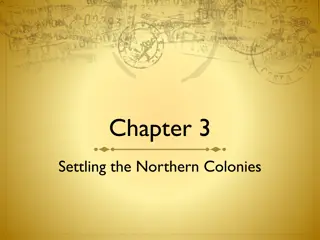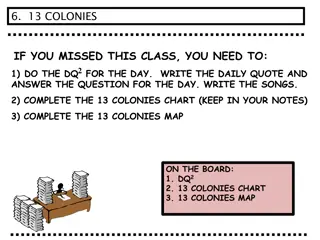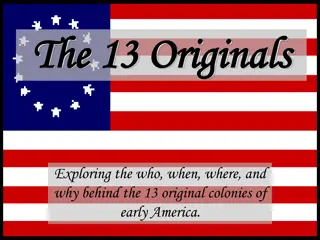Mastering English: A Comprehensive Approach to Teaching Language Skills
Education is not just preparation, but life itself. English language holds a vital place in our educational system and national life. This presentation explores the aims and objectives of teaching English, emphasizing the importance and impact of mastering the language at different education levels.
5 views • 32 slides
The Etymology of Modern English Vocabulary: A Detailed Analysis
The etymology of modern English vocabulary explores words of native Anglo-Saxon origin, Germanic borrowings, and English elements, examining their characteristics and assimilation into the language. It delves into the ways borrowing occurs, criteria for assimilation, and the distinct layers comprisi
8 views • 15 slides
Attitudes Toward Sports Among Colonial Settlers in the New World
The attitudes of European colonial settlers towards sports in New England, the Middle Colonies, and the South were deeply influenced by their religious backgrounds. While Puritans in New England were generally against play, Quakers and Dutch Calvinists in the Middle Colonies were more accepting. In
0 views • 19 slides
Evolution of English Literature: From Old English to Beowulf
The English language, evolving over 1,400 years, transitioned from Old English to Middle English with works like Beowulf standing as a pinnacle of Old English literature. The epic poem tells the tale of Beowulf's heroic feats in pagan Scandinavia, showcasing elements of alliteration, a key literary
0 views • 46 slides
Evolution of North American Law: From Common Law to Unique Legal Tradition
The historical origins of North American law trace back to the early 17th century, marked by the influence of English common law on the colonies. Over time, the American legal system evolved, absorbing elements from both the English legal tradition and local statutes. The development of the United S
0 views • 19 slides
Exploring the Intersection of Arabic and English Language Learning
Delve into the fascinating world where Arabic and English intersect, with a focus on language learning patterns, the brain's process of acquiring new information, essential driving patterns, English pronunciation, and the intriguing history of the English language's phonetic alphabet. Discover the c
0 views • 24 slides
Challenges and Perspectives in Academic Writing for English Students: Insights from Yemeni Education System
Amin Ali Ahmad Al-Solel, an Associate Professor of English Literature at Thamar University in Yemen, shares insights on the challenges faced by English learners in Yemen. From outdated curriculum and lack of resources to struggles with writing skills, the educational system in Yemen poses significan
0 views • 14 slides
European Advent in India: Colonial Rule and Trade Rivalry
Commercial contacts between India and Europe have a long history, with Europeans initially arriving as traders but eventually establishing colonies due to political and commercial rivalries. The Portuguese, Dutch, and English all played significant roles in shaping India's history through their trad
1 views • 18 slides
Importance of Teaching English at Different Education Levels
English language holds a significant position in the educational system and national life of India. This presentation by Dr. A. Mary Delphine highlights the aims and objectives of teaching English, emphasizing its importance in India and the modern world. The objectives include understanding the rat
1 views • 32 slides
Education in Colonial Times: A Historical Overview
Education in colonial times varied across different regions in America. The Northern colonies emphasized education with schools like Harvard College, while the South lacked formal education laws pre-Civil War. In the middle colonies, education was deemed important but left to families until laws wer
0 views • 10 slides
Latin American Revolutions: Causes, Events, and Impact
Latin American Revolutions from 1791 to 1825 marked a period of significant upheaval as colonies in the Western Hemisphere sought independence from Spanish rule. Driven by factors like inspired by other successful revolutions, Spanish mercantilist policies, and unequal wealth distribution, these rev
1 views • 12 slides
Forming the United States: From Colonies to a New Government
Explore the journey of the 13 colonies as they came together to form the United States of America. Learn about the creation of the Constitution, the fears of the founders regarding the abuse of power, and the transition from the weak Articles of Confederation to a stronger central government followi
0 views • 29 slides
Key Concepts of Colonization in North America: 1607-1754
Europeans from Spain, France, the Dutch, and England established colonies in North America with differing economic and imperial goals. Spain aimed for strict control and exploitation, while the French and Dutch focused on trade partnerships with Native Americans. English colonization attracted a lar
0 views • 11 slides
Causes and Impact of the French and Indian War on the American Revolution
The French and Indian War was caused by disputes over land and power between France and Great Britain, leading to a nine-year conflict that began in 1754. Tensions escalated as both countries claimed the Ohio River Valley, a key frontier region. The war had significant immediate and long-term impact
0 views • 17 slides
The Linguistic Impact of French Influence on the English Language
The Normans contributed over 10,000 words to the English language, shaping vocabulary related to government, authority, fashion, art, and more. The integration of French and Old English words led to the evolution of language during this period, with some words persisting while others were replaced o
0 views • 12 slides
The Colonists' Struggle for Rights and Unity: A Timeline
Colonists in the American colonies resisted British control and policies that they saw as violations of their rights, leading to organized opposition and boycotts. Events such as the Townshend Acts, the Boston Massacre, and the Tea Act of 1773 fueled tensions, prompting figures like Samuel Adams to
0 views • 10 slides
Impact of British Empire and Commonwealth on Migration: Unpacking Immigration Stories
Explore the historical impact of the British Empire and Commonwealth on British migration through six immigration stories. Understand how relations with former colonies have shaped diversity in Britain and influenced British immigration patterns. Key terms like migration, emigration, empire, and col
0 views • 23 slides
History of European Colonization in America
The visual content and text describe the early colonization of America by Europeans, focusing on the establishment of colonies like New Sweden and New Netherland. It illustrates the interactions between European settlers and Native Americans, the competition for land, and the growth of colonies at t
0 views • 14 slides
Insights into Fruit Bats: Behavior, Growth, and Senses
Fruit bats, also known as flying foxes, exhibit a wide variation in size, with some as small as two inches and others over 16 inches long. They are equipped with excellent vision and sense of smell, aiding in finding food sources and avoiding danger. Fruit bats have unique feeding habits with sharp
0 views • 9 slides
The Duel for North America: France's Colonization Efforts
France, like England and Holland, was a latecomer in the race for North American colonies. King Louis XIV took an interest in overseas territories, leading to the establishment of Quebec in 1608. Samuel de Champlain played a key role in French colonization efforts, forging alliances with Native Amer
0 views • 20 slides
Contrasting Shona and English Languages in Zimbabwe
The language of Shona in Zimbabwe, Africa, differs from English in various aspects such as script symbols, alphabet, official usage, borrowing of words, and number of speakers. Shona has a script with 35 symbols, while English has a 26-letter alphabet. English is the official language of the USA, wh
0 views • 5 slides
Influence of Indian English in "The Jewel in the Crown" by Rochana Jayasinghe
Indian English plays a significant role in the Indian subcontinent with 200 to 333 million English speakers. India is a key player in the English language landscape, publishing more books in English than any other language. The British Raj from 1858 to 1947 shaped the prominence of English in India,
0 views • 18 slides
The Tudor Dynasty (1485-1603): Key Events and Figures
The Tudor Dynasty (1485-1603) marked significant events in English history, including the rise of the powerful English naval fleet, acquisition of colonies, birth of the mercantile bourgeoisie, break with the Catholic Church, and spread of the Reformation spirit. Economic changes saw the transition
0 views • 5 slides
Colonial Influences and The British Empire
The British Empire once ruled over vast territories, including parts of North America, India, and Africa. European countries colonized other nations to expand trade and acquire resources. Colonization ceased in the 20th century due to moral objections and independence movements in colonies. The spre
0 views • 15 slides
English Colonization in North America: Lost Colony of Roanoke
Learn about the English colonization of North America, focusing on why England wanted colonies, the challenges faced by early settlers, the mysterious disappearance of the Roanoke colony, and theories surrounding its fate. Engage in writing prompts and explore historical events like the Mayflower Co
0 views • 12 slides
Exploration and Colonization in the New World: Chapters 1-2 Review
European exploration and colonization of the New World were driven by factors such as the search for new trade routes, desire for wealth, and spreading of religion. The consequences of exploration included the spread of disease, slave trade, and cultural exchanges between the Eastern and Western hem
0 views • 12 slides
Colonial America Founders and Colonies Overview
The content provides details about important founders and key characteristics of the New England, Middle, and Southern colonies in Colonial America. It covers founders like William Penn, Duke of York, Lord Baltimore, and James Oglethorpe, as well as information on staple crops, religious groups, pla
0 views • 7 slides
Contrasting Early Colonial Regions in America
Early New England, Middle, and Southern colonies differed in economics, geography, culture, government, and relations with American Indians. New England focused on subsistence farming and democratic town meetings. The Middle colonies benefited from fertile land and trade along rivers. The Southern c
0 views • 13 slides
British Class System and Migration to Former Colonies
The British class system categorizes individuals based on wealth, education, and occupation into working class, middle class, and upper class. Migration to former colonies like Canada played a significant role in shaping the demographics and cultural richness of these countries. The decision to immi
0 views • 13 slides
GCSE English Language and Literature Overview
GCSE English Language and Literature subjects are led by Mrs. A. Baker and Mr. Doodson. English Language is examined by OCR, while English Literature is examined by Edexcel. Both subjects have two examination papers worth 100% of the grade. English Language papers focus on reading and writing skills
0 views • 14 slides
The Evolution of Postcolonial Literature in English
The exploration delves into the evolution of postcolonial literature in English, contrasting the experiences of settler colonies and invaded colonies in adopting and adapting the English language. It discusses the impact of historical impositions and themes of identity, exile, and displacement acros
0 views • 15 slides
English Colonization: The Story of Roanoke
While England's first colony, Roanoke, faced challenges and mysteries, it set the stage for future English colonization efforts. The colonists, led by John White, settled in present-day North Carolina in 1585. Despite being helped by the Croatoan Indians, the colony ultimately failed. Virginia Dare,
0 views • 15 slides
Choosing the Right English Course for Your HSC: Advanced, Standard, or Studies?
When preparing for the HSC, selecting the appropriate English course is crucial as it is compulsory. Options include Advanced English, Standard English, and English Studies, each offering unique benefits. Advanced English challenges students with higher-order thinking skills, while Standard English
0 views • 25 slides
Immigration and Slavery in the American Colonies (1607-1765)
The American colonies experienced significant immigration, with English, Irish, and German settlers seeking a new beginning. Many English immigrants were indentured servants, while Irish and German immigrants faced push factors like war and religious persecution. Additionally, the slave trade played
0 views • 42 slides
The Story of New England Colonies: Pilgrims, Puritans, and Plymouth Colony
Explore the history of the New England colonies including Plymouth, Massachusetts Bay, Rhode Island, Connecticut, and New Hampshire. Discover the impact of geography on their development, the differences between Pilgrims and Puritans, and the founding of Plymouth Colony by the Pilgrims led by Willia
0 views • 24 slides
Colonial America in Review
Explore key aspects of Colonial America through a test review covering the founding of colonies, influential figures like William Penn, significant locations such as New Orleans, and concepts like pacifism and debtors' colonies.
0 views • 35 slides
Life in the Colonies: A Detailed Exploration
Explore what life was truly like in the colonies through a series of tasks involving homework, updating tables of contents, analyzing newspaper articles, and reflecting on various aspects such as farming, city life, rights of colonists, African American experiences, religion, education, colonial fam
0 views • 4 slides
Settling the Northern Colonies: Religious Transformation and Colonization
The Protestant Reformation led to the emergence of Puritanism in the Northern Colonies, with figures like Martin Luther and John Calvin shaping religious beliefs. The Massachusetts Bay Colony stood as a beacon of self-government and religious ideals, while dissenters like Anne Hutchinson and Roger W
0 views • 9 slides
Explore the 13 Colonies: History, Charts, and Maps
Dive into the fascinating world of the 13 Colonies, understanding their origins, characteristics, and significance. Discover the New England, Middle, and Southern Colonies through detailed charts, maps, and insightful information about their establishment, economies, and societal structures. Uncover
0 views • 23 slides
Exploring the 13 Original Colonies of Early America
Uncover the historical significance of the 13 original English colonies in early America. Dive into when they were founded, who established them, and the motives behind their creation. Engage in map activities to understand the colonization process and recognize the lasting impacts of European settl
0 views • 23 slides


